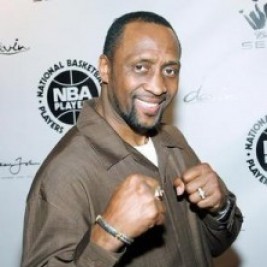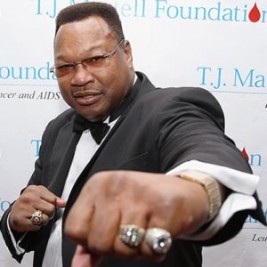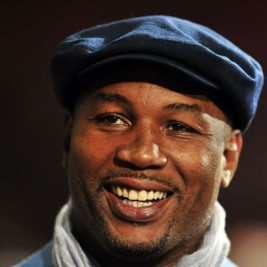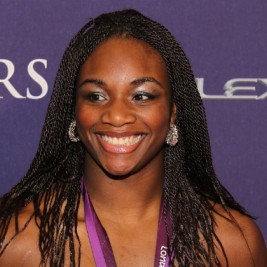
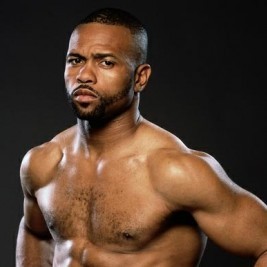
Corporate Appearances, Speaking Engagements, Autograph Signings, Endorsements, VIP Meet & Greets, Store Grand Openings
Book Roy Jones Jr for a Speaking Engagement
Businesses, Non-profit organizations, event planners and companies across the country have worked closely with our booking agents to hire Roy Jones Jr for a speaking engagements, guest appearances, product endorsements and corporate events. Many of those same clients have continued to turn to our speakers bureau as we can easily align Roy Jones Jr’s availability with their upcoming seminar, gala, annual conference, corporate function, and grand opening. Our close relationship with Roy Jones Jr’s booking agent and management team further enables us to provide inquiring clients with Roy Jones Jr’s speaking fee and appearance cost.
If your goal is to hire Roy Jones Jr to be your next keynote speaker or to be the next brand ambassador our celebrity speakers bureau can assist. If Roy Jones Jr’s booking fee is outside your companies budget or your unable to align with his appearance availability, our booking agents can provide you a list of talent that aligns with your event theme, budget and event date.
Jones was Ring Magazine's "Fighter of the Year" in 1994 and was voted the "Fighter of the Decade" in 1999 by the Boxing Writers Association of America. Between 1999 and 2003, Jones was considered by many as the best pound for pound fighter in the world, particularly after his dominant win over Reggie Johnson. Jones's adviser and sometime manager is Pensacola lawyer Fred Levin. His longtime trainer is Alton Merkerson.
Roy Jones Jr. had a very successful career as an amateur boxer - he won the 1984 United States National Junior Olympics in the 119 lb. weight division, he won the 1986 United States National Golden Gloves in the 139 lb. weight division and he won the 1987 United States National Golden Gloves in the 156 lb. weight division.
Jones represented the United States at the 1988 Seoul Olympic Games. His participation there proved to be controversial when he lost a highly disputed 3-2 decision in the final. Jones lost to South Korean fighter Park Si Hun, despite pummeling Park for three rounds, landing 86 punches to Park's 32. Allegedly, Park himself apologized to Jones afterwards. One judge shortly thereafter admitted the decision was a mistake, and all three judges voting against Jones were eventually suspended. Most observers still believe the judges were either bribed or otherwise coerced to vote for the local fighter by Korean officials. However, the official IOC investigation concluding in 1997 found no wrongdoing, and the IOC still officially stands by the decision. Ironically, Jones was still awarded the Val Barker trophy as the best boxer of the 1988 games. The incident, along with another highly disputed decision against American Michael Carbajal in the same games, led Olympic organizers to establish a new scoring system for Olympic boxing.
After the 2002 Winter Olympics scandal where the Olympic committee decided to award gold medals to both Russia's and Canada's figure skating teams after finding that the French judge had been bribed, Jones had hoped that the committee would re-open his case and award him a gold medal, but no such action was taken.
The Jones controversy still lingers for many sports fans. Some Korean fans claimed that USOC officials retaliated for the Jones decision at the 2002 Salt Lake City Winter Olympics by disqualifying Korean skater Kim Dong-Sung from the men's 1500 meter short-track speed skating for an infraction known in the sport as crosstracking (illegally cutting off a competitor), even though International Skating Union officials, not the USOC, made the disqualification. This disqualification handed the gold to American Apolo Anton Ohno. Similar allegations were raised at the 2004 Summer Olympics in Athens, when American gymnast Paul Hamm won the gold in the men's all around over Korean Yang Tae-Young, from whom the judges incorrectly docked one tenth of a point, which would have made Yang the champion. The three judges who made the scoring mistake against Yang, none of whom were American, were all suspended. Unlike the Jones incident, no evidence of official conspiracy on behalf of Hamm or Ohno was ever proven.
Besides a stellar amateur career and a decade of diligent training, by the time he turned professional, Jones had already sparred with many professional boxers in the gyms including NABF champion Ronnie Essett, IBF world champion Lindell Holmes and all-time great Sugar Ray Leonard. Jones began as a professional on May 6, 1989, knocking out Ricky Randall in two rounds in Pensacola. For his next fight, he faced the more experienced Stephan Johnson in Atlantic City, and beat him by a knockout in round eight.
Jones built an impressive record of 15-0 with 15 knockouts before stepping up in class, when he met former world Welterweight champion Jorge Vaca in a Pay Per View fight on January 10, 1992. He knocked Vaca out in round one, to reach 16 knockout wins in a row. After one more knockout win, Jones went the distance for the first time, against former world champion Jorge Castro, who lost a 10-round decision to Jones in front of a USA Network national audience.
Three more knockouts in a row followed, after which Jones was given his first opportunity to fight for a world title: on May 22 of 1993, he beat future world champion Bernard Hopkins by a clear unanimous decision in Washington D.C., to capture the IBF's vacant World Middleweight Title. All three judges scored the fight 116-112. For his next fight, he chose to fight another future world champion, Thulane "Sugar Boy" Malinga, in a non-title affair. Jones beat Malinga by a knockout in six. Jones finished the year with another non-title fight, beating Fermin Chirino by decision.
1994 was a very diverse year for Jones. He beat fringe contender Danny "Popeye" Garcia by a knockout in six in another non-title bout, then retained the world title against Thomas Tate in two rounds at Las Vegas on May 27. By this point in his career, Jones was considered to be in the extreme upper echelon of the sport, widely considered one of boxing's Top Four "pound for pound" fighters. On November 18, he and the IBF's World Super Middleweight Champion, James Toney, another member of the elite "pound for pound" contenders, met in an anticipated bout at Las Vegas. Jones was able to turn the highly-anticipated fight into a mismatch. He dropped Toney in round three, won virtually every round, and won by a unanimous decision to win the IBF World Super Middleweight Title. His outstanding year in the ring was slightly tainted when shortly after his fight with Tate, he was caught by police in the Bahamas, and accused of carrying a gun at Nassau's airport.
Jones' proposed opponent for a long time was his good friend Gerald McClellan and many people felt that they would form an exciting rivalry in professional boxing. McClellan had defeated Jones in amateur boxing at the 1988 United States National Golden Gloves in the 156 lb. weight division and won his WBC world Middleweight title in the same month that Jones won his IBF version. McClellan moved up to the Super Middleweight division to fight WBC World Super Middleweight Champion Nigel Benn on February 25, 1995, just a few months after Jones had fought Toney. McClellan had been included in the majority of journalists Top Five in the "pound for pound" ratings following his chilling 83-second knockout of Julian Jackson. But McClellan was tragically left permanently disabled at the hands of Benn, and the state in which Jones' friend was left seemed to have an effect on Jones, whose style has been criticized as too cautious. Jones would constantly cite the nightmare of February 25, 1995 as his reason for not going head first for knockouts and why he wanted to make his money and get out of the business with his health.
In 1995, Jones defended his IBF Super Middleweight title successfully three times, knocking out Antoine Byrd in round one, former Lightweight and Junior Middleweight World Champion Vinny Pazienza in round six, and Tony Thornton in round two.
In 1996, Jones maintained his winning ways, defeating Merqui Sosa by a knockout in two, future world champion Eric Lucas in round 11, Bryant Brannon in round three, and former multiple world champion and eventual hall of famer Mike McCallum, by a decision in 12, to become a member of boxing's exclusive group of world champions in three weight divisions by winning the vacant WBC World Light Heavyweight Championship. When he boxed Lucas, he became the first athlete to participate in paid basketball and boxing events on the same day, because he had played a game in Alabama in the morning and crossed back over the state line after his game, to defend his title in his hometown that evening.
1997 began with more controversy for Jones. He suffered his first professional defeat at the hands of Montell Griffin, losing his World Light Heavyweight belt in the process. But the defeat was also filled with controversy, because Jones had dropped Griffin with a series of hard and fast, head and body punches in round nine, and then hit him again twice on the head as Griffin was down on the canvas on his knees, leading to Jones Jr.'s disqualification. They had an immediate rematch, and on August 21, Jones regained the World Light Heavyweight Title by knocking out Griffin in the first round. By then, Jones had signed a lucrative contract with HBO, to have all his fights telecast on the HBO Boxing TV show.
In 1998, Jones began by knocking out former Light Heavyweight and future World Cruiserweight Champion Virgil Hill in four rounds in a non-title bout at Biloxi, Mississippi with a sharp right hook to the body. He followed that with a win against the WBA's world Light Heavyweight champion, Puerto Rico's Lou Del Valle, by a decision in 12 on July 18, to unify the WBC and WBA belts. In the fight with Del Valle, he had to climb off the canvas for the first time in his career, as he was dropped in round eight. Then followed a defense against Otis Grant. He retained the crown in that fight by a knockout in ten.
Jones began 1999 by knocking out New York City cop Rick Frazier in a mismatch. After this, many boxing critics started to criticize Jones for fighting grossly overmatched mandatories who few had ever heard of. Roy Jones also drew criticism for never fighting Dariusz Michalczewski, an unbeaten Polish fighter who had been stripped of a pair of championship belts without losing in the ring. In his only other fight that year, on June 5, he beat the IBF's world champion, Reggie Johnson, by a decision in twelve to add that belt to the WBC and WBA belts he already owned in the division.
2000 began with a bang for Jones, as he beat the hard punching but limited David Telesco by a decision in twelve to retain the world championship, on January 15, in what was the Radio City Music Hall's first boxing show ever. Jones entered the ring that night surrounded by the famous group of dancers, The Rockettes. His next fight was also a first-time boxing event for a venue, as he traveled to Indianapolis and retained his title with an 11-round TKO over Richard Hall at the Conseco Fieldhouse. He ended the year by beating Eric Harding in a close fight, once again retaining the title.
In 2001, Jones released a rap CD, his most noticeable song on it being Ya'll Must've Forgot, probably referring to the fact that some critics who used to point him out as the world's best fighter pound-for-pound were now criticizing his quality of opposition. That year, he retained the title against Derrick Harmon by a knockout in ten, and against future world champion Julio Gonzalez of Mexico by a 12-round unanimous decision. There was strong talk of Jones facing F"lix "Tito" Trinidad in a super-fight, but that possibility was soon forgotten after Trinidad was defeated by Hopkins.
In 2002, Jones retained his title, beating another grossly overmatched fighter, Glenn Kelly, by a knockout in seven, famously dodging Kelly's punches while holding his hands behind his back, mimicking one of his fighting game cocks, and then unleashing a furious right hand that knocked out Kelly. He then defeated Commonwealth of Nations champion of England Clinton Woods by a knockout in six. Few in the US had ever heard of Woods before his fight with Roy Jones. The Woods fight was held at the Rose Garden in Portland, and it was, once again, the first time boxing had been held at that venue, and also the first time in 45 years Portland had a world title fight.
Jones then announced he would challenge John Ruiz for the WBA's World Heavyweight Championship. On March 1 of 2003, he defeated Ruiz by a twelve-round unanimous decision to become the first World Middleweight Champion in 106 years, and the second World Light Heavyweight Champion to win a World Heavyweight title. At the time of the fight, Lennox Lewis was regarded as the legitimate World Heavyweight Champion and Ruiz was ranked as the #5 contender by Ring Magazine. The day before the fight, people from Jones' and Ruiz's entourages became involved in a press conference brawl, with Ruiz's manager requiring hospitalization.
Jones decided he wanted to keep campaigning as a Light-Heavyweight and eventually relinquished the WBA Heavyweight title. On November 8, 2003, Jones recovered his old belt with a 12-round majority decision over Antonio Tarver. This was a very close fight with Jones looking sluggish and tired throughout. Tarver was able to catch him on the ropes repeatedly but Jones, to his credit, fought bravely during the championship rounds of the fight. It was speculated that Jones lost over 20 lbs in a few short weeks before the fight to meet the weight minimum that caused him to get tired quickly.
On 15 May 2004 Jones faced a rematch with Antonio Tarver. Despite the fact that Jones was heavily favoured to win, Tarver knocked him out at 1:41 of the second round. This, Jones' first unquestionable loss, sent shock waves through the boxing world. Jones had won the first round, but in the second, as he was in a corner, was caught by a big left hook by Tarver and knocked out. He tried to get up, and did so with much effort, but was barely able to beat the count of ten and was deemed unable to continue by referee Jay Nady.

Let our team of booking agents help create a memorable experience with hiring Roy Jones Jr for your store grand opening, golf outing, trade show booth or corporate outing.
NOPACTalent acts as a Celebrity Speakers Bureau and Athlete Booking agency for corporate functions, appearances, private events and speaking engagements. NOPACTalent does not claim or represent itself as Roy Jones Jr’s speakers bureau, agent, manager or management company for Roy Jones Jr or any celebrity on this website. NOPACTalent represents organizations seeking to hire motivational speakers, athletes, celebrities and entertainers for private corporate events, celebrity endorsements, personal appearances, and speaking engagements.



